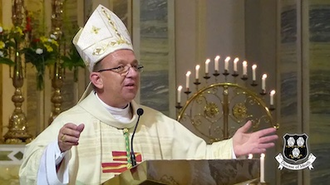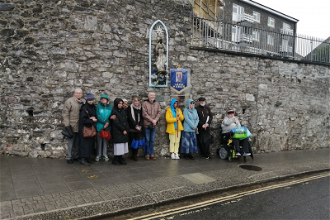Bishop Deenihan: The private Catholic is by nature, a poor missionary

Bishop Tom Deenihan - Image Diocese of Meath
Source: Irish Catholic Media Office
Bishop Tom Deenihan, Bishop of Meath, celebrated Mass yesterday in Saint Mary's Pro Cathedral, Dublin. Members of the Legion of Mary from throughout the country attended. The Mass was offered for the repose of the soul of Servant of God Frank Duff, founder of the Legion.
The text of Bishop Tom's homily follows.
I am delighted to be with you this afternoon for Mass to celebrate the 41st anniversary of the death of the Servant of God, Frank Duff. I am also conscious that we are celebrating this year the centenary of the founding of the Legion of Mary. By any standard, the centenary itself, as well as the scope of the apostolate of the Legion in terms of tasks and geographical spread, is remarkable.
In that context, the Gospel of our Mass today has something to offer regarding the Apostolate of the Legion of Mary. The Gospel is a familiar one. Christ visits two sisters. The hard working Martha gets annoyed with the somewhat lazier Mary and on the spur of the moment loses control of her tongue, lashes out and appeals to the visitor to take her side. Martha feels that as co-host, Mary should be doing something more practical than sitting and talking with Christ. Part of the difficulty with today's gospel is that we feel a degree of sympathy for Martha and consequently may feel that Christ's retort was a little unfair. After all, it was Saint Therese who commented on this gospel passage that if Martha had imitated Mary, Christ would have went without his dinner!
Both sisters, or more correctly, the different approach by both sisters, has been taken to typify religious life in the Church - the contemplative, as typified by Mary, and the Apostolic, as typified by Martha. A true believer and a real faith will need to encapsulate aspects from both Mary and Martha.
Indeed, you could suggest that the Legion of Mary, under the clear direction of Frank Duff, was a happy merger of both Mary and Martha, the contemplative and the apostolic, or, more simply put, prayer and action! From its inception, the Legion of Mary, as you know better than I, was a merger of prayer and apostolic action, prayer and practice.
Finola Kennedy, in her 2011 biography of Frank Duff, 'Frank Duff, A life Story' tells us that his membership of the Society of Saint Vincent de Paul around 1913 proved to be a turning point in his understanding of the Christian vocation. This, allied with his membership of the Pioneer Total Abstinence Association from 1917 onwards, led to the germination of the seed that grew from 1921 onwards into the Legion of Mary. The 'apostolic' or 'Martha' dimension of the Christian vocation remained at the core of what Duff envisaged for the members of the Legion of Mary, something attested by his concern for prostitutes and the establishment of hostels here in Dublin for 'derelict' men and women. That was, in many ways, the Vincent de Paul legacy. The importance of prayer and sacrifice, or the 'Mary' model may well have been a product of the religious practices and prayers associated with membership of the Pioneer Total Abstinence Association.
One of the big concerns from Old Testament times was the separation of liturgy and life. The prophet Amos highlighted it in his day. Christ referred to 'whitewashed sepulchres' and those who were oblivious to the sufferings and plight of others like the parable of Lazarus and Dives. It is a reoccurring theme for believers of all creeds. What we profess in church on Sunday can, sometimes, have little impact on what we do for the rest of the week. In its extreme form, it causes scandal and leaves believers open to the charge of hypocrisy.
The Gospels also speak clearly of the obligation to share one's faith. Lamps under bushels, buried talents and faith shown by good deeds are all examples. The Second Vatican Council was clearer and spoke of the Church being missionary - each parish was either establishing a mission of developing one. The private Catholic is, by nature, a poor missionary. The Legion of Mary understands this. Indeed, its' Raison d'etre is to be the missionary Church.
Frank Duff was, as you know, invited to attend part of the Second Vatican Council where he was accorded a standing ovation by the bishops of the world. Vatican II's teaching on the Church, the lay apostolate, and the emphasis on the centrality of the vocation from baptism was in some way a confirmation of the work of Frank Duff and a vindication of the Legion of Mary.
That outward looking and missionary Church, typified by acts of outreach, charity and compassion is very much the model that Pope Francis has for the Church of today. Indeed, a recent article on the Legion of Mary in The Tablet said that the Legion of Mary, founded as it was one hundred years ago, prefigured many of the themes of Pope Francis' pontificate.
The scope of the work extended from here to China, where the Legion was established and worked collaboratively with Columban missionaries. This was in keeping with Duff's statement that the Legion was a priest's organisation, par excellence, and is, in fact, an extension of him.
Sadly, that unity of purpose was not always recognised and Duff was not always supported. His relationship with Archbishop McQuaid of Dublin has been well aired but, to be fair, McQuiad wrote to the Apostolic Nuncio in 1963 and said that Duff was 'utterly loyal'. The Irish Bishops said of the Legion in 1971, the year of the Legion's Golden Jubilee, that 'the supernatural faith and courage of the founding members have merited the grace not only of survival, through every kind of human vicissitude, but also a diffusion throughout the world. That is still true. There are people throughout the world whose only connection with Ireland is through the Legion of Mary.
If the institutional Church displayed some hostility to the Legion, it could be argued that this was replicated in general Irish society to some extent. Mary Kenny acknowledged same in a recent article in the Irish Catholic. She admitted to looking on the Legion as a bunch of 'Holy Joes'. She also acknowledged that it would be some years before she would learn of the work of Legion members in poorer areas and with those who suffered from alcohol, drug addiction, poverty and were sexually exploited. The Morning Star Hostel for homeless men opened in 1927 and the Regina Coeli hostel for homeless women and a shelter for unmarried mothers opened in 1930. It is also of note that the Legion was open to both male and female members.
Things have progressed since then. The Legion now has three million members in over 170 countries and the handbook has been translated into 100 languages. Names like Edel Quinn and Alfie Lamb in Africa and South America respectively are among the more recognisable and lauded members. The legacy of the Legion has been remarkable on Catholicism and Lay involvement.
It is, as I mentioned, one Hundred years since the Legion was founded and forty one years since Frank Duff died. While these are short periods in human history and in our memories, much has also changed in these periods.
The sex workers of Dublin that the early Legion members assisted have now become the trafficked women from around the world who are sent to every Irish county, to be used and exploited.
The homeless we still have and those who have not come to know the joy and hope of the Gospel of Christ are still with us and are of all ages and are our colleagues, neighbours and relations.
The need for the Legion is still there, perhaps even greater. While membership is reducing in Ireland, membership is growing in Africa, South America and South Korea.
Pope Francis has, as you know, stressed the importance of a less clerical, more synodal, mission orientated, outward looking church. The Legion of Mary is well equipped and experienced in this area. Please God, in the weeks and months ahead, the Legion will be able to assist the Irish Church on that journey through the prayerful contemplation of Mary and the practical action and assistance of Martha but always loyal to the Church and faithful to the baptismal calling and the calling to holiness.
In an essay published in 1976, Frank Duff wrote: 'I fear that the majority of our people have but a mechanical goodness. They attend Sunday Mass and the Sacraments but have no depth in their religion. They do not know it properly nor live their lives according to it'. Again, that separation of liturgy or prayer from Life that Amos warned against.
Let us renew our prayers on this Anniversary that the Servant of God, Frank Duff, and his authentic spirituality and witness, a combination of the prayer of Mary and the action of Martha, will continue to contribute to the good of the Church and the growth and support of faith.
I wish you a happy anniversary of the Legion, I thank you for your selfless witness to Christ and to the mission of evangelisation and I wish you continued success in spreading the joy of the Gospel and in witnessing to your own faith because Mary without Martha, faith without practice, faith without implications for daily living, is no faith at all but that mechanical goodness that shocked Frank Duff!


















